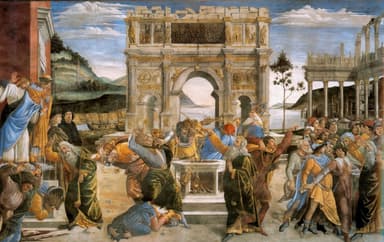Response ·
“Now We Act as If Everyone We Encounter Might Be Grieving”
By Sarah RindnerCommitted to developing and supporting the intellectual, religious, and political leaders of the Jewish people and the Jewish state.

Sarah Rindner is a writer and educator. She lives in Israel.
Response ·
Committed to developing and supporting the intellectual, religious, and political leaders of the Jewish people and the Jewish state.

Observation ·
Traditional lines between the secular and religious populations are fading, particularly in the realms of music and art.

Observation ·
Featuring wars, peacemakers, two cultures, pogroms, plays, four ages, wild problems, caves, magic, letters, American conservatives, liberal parents, radical children, and more.

Observation ·
Last month saw the first-ever production of Herzl's little-known play The New Ghetto in the country he brought into being. The performance was touched with the sublime.

Observation ·
A video of a discussion earlier this month with the Mosaic columnist Eli Spitzer and Sarah Rindner about the former's attention-grabbing argument about Modern Orthodox Judaism.

Observation ·
Five of our regular writers pick several favorites each, featuring Turkish denial, Jesus's wife, coffeehouse culture, angst, WEIRDness, and Judaism straight up.

Observation ·
Even while we currently adhere to responsible social distancing, the sheer wonder of acculturating into life in the Jewish state is far from wearing-off.

Observation ·
Six more Mosaic writers share their favorites, featuring shadow strikes, orchards, gleanings, constitutional evolutions and revolutions, serotonin, odd women, and more.

Observation ·
The Tomb has become a shrine for thousands of pilgrims, just as Rachel herself has become the religion's ultimate matriarch. Why?

Observation ·
By and for Orthodox women, Mikva, which has affinities with The Vagina Monologues , opens up a once-secretive ritual while staying firmly in line with tradition.

Observation ·
Exploring the great Argentinian writer's unusual fascination with Judaism and enthusiasm for the Jewish state.

Observation ·
Why the first of Nisan, which falls on this coming Saturday, would seem to be the most important date of all.

Observation ·
The Torah doesn't outright end slavery, which was ubiquitous in the ancient world, but it does take the first steps toward ameliorating and transforming it.

Observation ·
Letters, antidotes, eternal lives, outcasts, secret worlds, pogroms, and more.

Observation ·
Jewish history has not always been characterized by laughter, but in Genesis it evokes the freedom and joy of a life in partnership with God.

Observation ·
Is a biblical commandment against taking a mother bird with her young intended to teach mercy, or is it about something else?

Response ·
Committed to developing and supporting the intellectual, religious, and political leaders of the Jewish people and the Jewish state.

Observation ·
Unlike the case with nearly every other Tabernacle fixture, the function of the menorah does not cease when the Jewish people no longer possess a Temple.

Response ·
Committed to developing and supporting the intellectual, religious, and political leaders of the Jewish people and the Jewish state.

Observation ·
The Cecil B. DeMille version of the revelation at Sinai, in which Moses ascends the mountain on his own and returns bearing tablets, misses key aspects of the Israelites' experience.

Observation ·
Lekh l’kha narrates the birth of the Arabs, the Ammonites, the Moabites, and, of course, the Jewish people.

Observation ·
The monarchy begins twice.

Observation ·
Koraḥ's failed rebellion against the leadership of Moses shows that a culture based on grievance cannot last.

Observation ·
The law in Leviticus seems morally questionable, not to mention out of line with the Bible's otherwise encouraging stance toward the bearing of children. What's it really about?

Observation ·
The great song marking the Israelites' safe crossing of the Sea of Reeds is the Hebrew Bible's only full-length poem recited collectively by the people as a whole. What is it really about?

Observation ·
The story of Joseph sets up two archetypes: the righteous dreamer (Joseph) and the flawed but penitent sinner (his brother Judah). Both have a place in the tradition, but one is preferred.

Unlock the most serious Jewish, Zionist, and American thinking.
Subscribe Now